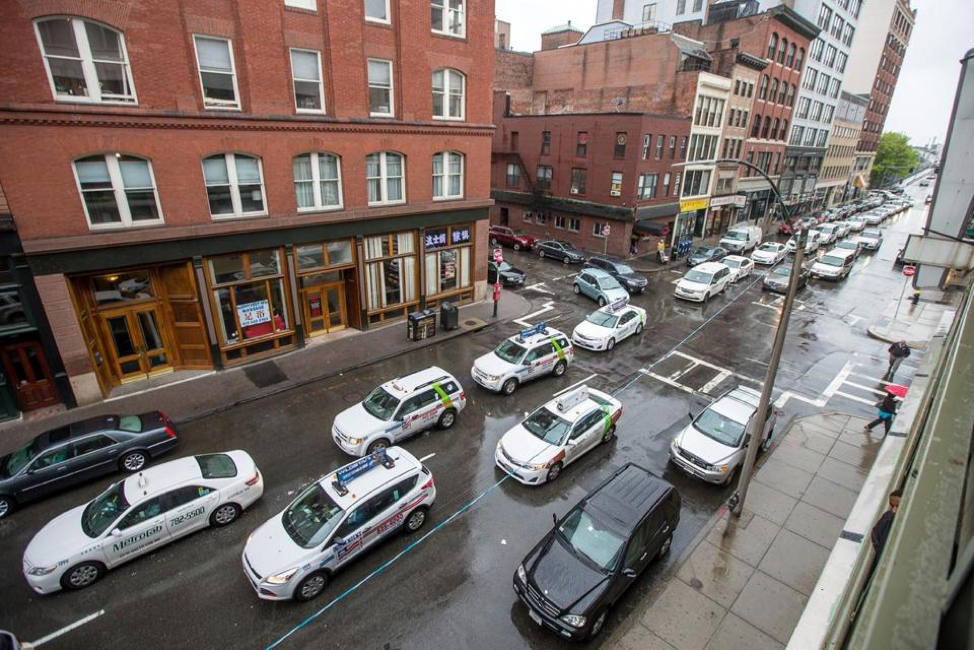By Benjamin Carroll
The sharing economy is an emerging economic system that revolves around the idea of people sharing existing resources with other people for a price. In reality, just about every business is based on this concept and since people have lived in communities, this “sharing economy” has existed. However, in the 21st century marketplace, barriers to entry in almost any industry would prevent the average person from conquering the task of sharing their resources. With the help of social media, companies which provide traditional services like transportation, lodging, and meals have been able to market themselves as new and revolutionary concepts by allowing just about everyone to become part of the movement.
Specifically, Uber, has distinguished itself in the marketplace by allowing an average person to share his or her car, and bypass existing legislation that would traditionally make it unfeasible for the average person to drive for commercial benefit. For example, to license a taxi cab in Boston, drivers are required to purchase a medallion, which is heavily regulated to account for traffic flow and public nuisances. These medallions could cost between $70,000- $180,000 in Boston. An Uber driver is allowed to drive people in Boston for commercial benefit by downloading an app, buying a car, and now after new legislation, passing a background check. Uber and other social media driven businesses connect local resources with local consumers and remove the opportunity costs from the equation. Through this model, they have become a disruptive economic force. In 2008, ride sharing did not exist, but in 2015 it was a billion-dollar industry in the U.S. alone and Uber is currently valued at $51 billion. This disruptive business is not just impacting the country economically and fundamentally changing the way people travel, it is also changing the rights of states and municipalities, by moving a function, taxis and municipal transportation, from city control to state control.
Right here in Massachusetts, the “ride sharing” bill, which attempts to regulate Uber and other ride sharing programs at the state level, was passed by the Massachusetts state legislature on August 1, 2016. The regulation creates a mandatory two tier background check on drivers, a division within the Department of Public Utilities (a state agency) to regulate ride sharing companies, bans ride sharing companies from operating at Logan International Airport until the airport sets a policy to handle the vendors, and a tax, which goes to the municipality in which the ride sharing transaction occurs.
The significance of this policy, however goes beyond its implications for operating a ride sharing program, it represents the state taking control of a traditionally city-run function, regulating taxis. In Boston, the Hackney Carriage Unit, a subsection of the Boston Police Department, has been regulating and licensing taxis since 1854, but so far have been unsuccessful in regulating ride sharing programs. Ride sharing companies have been able to bypass the rules facing taxis and city control by arguing that they are fundamentally different from taxi’s because they do not solicit passengers in the same manner as a customer hails a taxi cab, their customers use an app. However, in March of this year, a U.S. district court judge in Boston ruled that Uber and taxi services are both Hackney Carriage services. This should mean in theory, that Boston should be able to retain the ability to regulate these ride sharing programs, but the “ride sharing” bill passed by the Massachusetts legislature says otherwise.
So the question remains, could Boston regulate the ride sharing companies in ways that undermines the states legislation? Boston, like every other municipality in the commonwealth, is entitled to home rule, which was adopted in Massachusetts by a constitutional amendment in 1966. Home rule allows cities to control policies that the state has power to grant them control over. Typically, this means that cities can legislate city-wide issues as they see fit and it gives local government significant control over local issues. Specifically, when Massachusetts adopted home rule, the state reserved the right to “to regulate elections; levy, assess and collect taxes; borrow money or pledge a municipality’s credit; dispose of parkland; enact private or civil laws; and impose criminal penalties.” It seems that regulating Uber would be in the jurisdiction of the state because it would require the enacting of private and civil laws. However, to approve a special charter, a petition which allows a municipality to act within the specifically enumerated rights of the states, the municipality must submit a request to the attorney general. This makes it clear that the state retains control over the issue, however, the courts have final say. History shows us that the federal court will take into account the history of the industry and it is possible that regardless of state legislation and the rules enumerated in the constitution, a federal court would weigh the local nature of Uber issue, and the fact that Boston has successfully regulated taxi services for over 100 years without significant state controversy.
Student Bio: Benjamin is a staff member on the Journal of High Technology Law. He is currently a 2L at Suffolk University Law School. He possesses a BSBA in Accounting and a BA in Public Administration from Stonehill College.
Sources:
Benita Matoska, What Is the Sharing Economy?, The People Who Share, (Sept. 1, 2016) http://www.thepeoplewhoshare.com/blog/what-is-the-sharing-economy/.
Medallions and Licenses for Sale/Lease, Driver Zoo, http://www.driverzoo.com/LicenseandMedallion.
2015: The Year The Rideshare Industry Crushed The Taxi, Rideshareapps.com, http://rideshareapps.com/2015-rideshare-infographic/.
Alison Bauter, MA Passes Uber, Lyft Regulations Package in Late-Night Vote, Beacon Hill Patch, (Aug. 1, 2016) http://patch.com/massachusetts/beaconhill/massachusetts-passes-uber-lyft-regulations-package-late-night-vote.
Jim O’Sullivan, Boston ordered to revise regulations on taxis, ride-hailing services, The Boston Globe, (Mar. 31, 2016) https://www.bostonglobe.com/metro/2016/03/31/boston-ordered-revise-regulations-taxis-ride-hailing-services/YtU60Y01l8TiEGbQu82qsL/story.html.
Municipal Law Unit , Mass.gov, http://www.mass.gov/ago/government-resources/municipal-law/.
Disclaimer: The views expressed in this blog are the views of the author alone and do not represent the views of JHTL or Suffolk University Law School.

